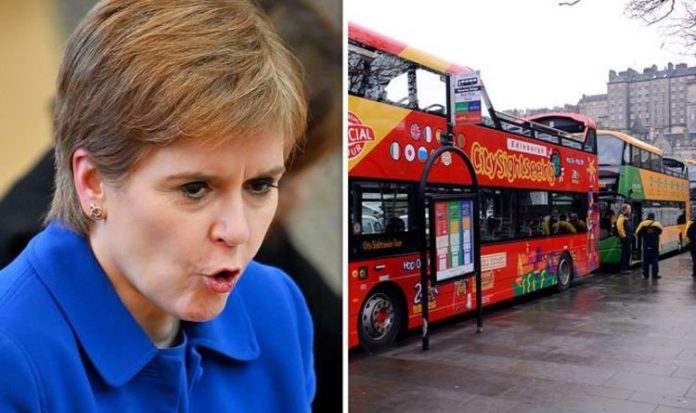Nicola Sturgeon made ‘basic mistake’ says Tony Miklinski
Ahead of Scotland’s 2014 independence referendum, the Scottish National Party (SNP) tried to reassure voters by citing a resurgent economy, a relatively modest budget deficit and the prospect of free trade with both the UK and the EU. However, things look very different now. Brexit means that an independent Scotland in the EU — the SNP government’s goal — would face a hard border with England, its most important market.
Moreover, data released in August showed Scotland’s national fiscal deficit climbing to £15billion in the year to April – even before the worst of the coronavirus crisis was felt.
While in the past few months, opinion polls have given “Yes” campaigners a consistent lead over their unionist rivals, economists are now warning that the economic and fiscal difficulties of leaving the UK look substantially greater than they did when voters rejected the idea in 2014.
In an interview with Express.co.uk, economics professor at Edinburgh Napier University Piotr Jaworski cast a shadow over the SNP’s plan to achieve independence, as he claimed Scotland doesn’t even have money to pay for buses.
He said: “We will either go bankrupt or we will have to cut our spending.
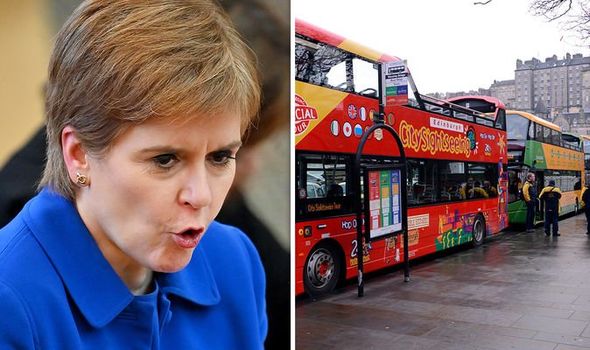
Sturgeon’s independence dream crushed as Scots ‘don’t even have money for buses’ (Image: GETTY)
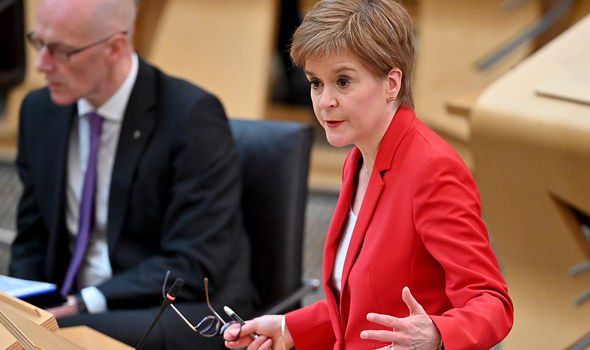
Scottish First Minister Nicola Sturgeon (Image: PA)
“But there is a problem with that.
“If we really want to leave Britain and join the EU, we would need to go through a very harsh transformation of the public sector.
“I don’t think the Scottish people are prepared for this.”
Prof Jaworski noted: “So if we have a referendum, Scottish people might vote for going out.
“But they would almost immediately realise that it means no more free prescriptions.
“Then, it would be too late.”
Moreover, because of the state of its economy, the Professor argued it will be very unlikely Brussels will allow an independent Scotland to join its bloc.
He said: “First of all, countries that have splitting tendencies, such as Spain or Belgium, will never agree.
JUST IN: EU crisis as Merkel’s furious outburst at Macron exposed
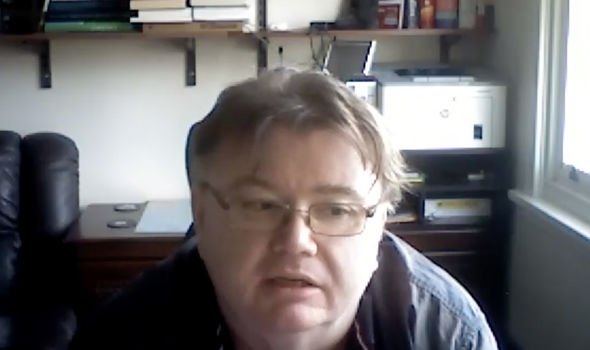
Professor Piotr Jaworski (Image: EXPRESS.CO.UK)
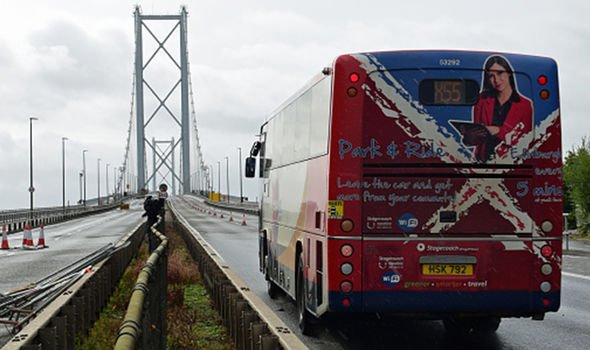
South Queensferry, Scotland (Image: GETTY)
“You then have got countries like Germany and France… and the question is ‘why should they want Scotland in?’
“I personally don’t know why.
“We don’t have a big economy, we would have problems almost like Greece, in terms of public deficit.
“Is it really in their interest to have another Greece?”
Prof Jaworski noted Ms Sturgeon should find something to make Scotland more attractive in the eyes of Brussels.
He added: “The First Minister is trying… with talks about electricity and power.
“But do we have it now? Can we sell it? Who is going to invest in this.
“We don’t even have money to invest in the buses…”
The economist’s claims were echoed by Ronald MacDonald, research professor of macroeconomics and international finance at Glasgow University’s Adam Smith Business School, who argued Ms Sturgeon’s independence bid is incredibly dangerous.
He said: “The underlying deficit has not changed too much since last year.
DON’T MISS:
Gordon Brown’s warning to Sturgeon: ‘Rest of UK will get pensions’ [INSIGHT]
EU’s invitation to CPTPP slapped down by Boris Johnson’s trade adviser [EXCLUSIVE]
EU admits copy and pasting 13-year-old framework in Brexit trade deal [REVEALED]
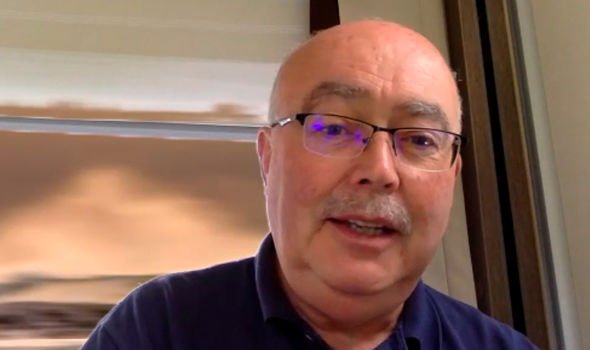
Professor Ronald MacDonald (Image: EXPRESS.CO.UK)
“It went up by half a percent, I think.
“That is not a sustainable deficit in itself.
“So they [the SNP] have argued in the Growth Commission report that they could handle that by having higher growth if they were independent.
“But they haven’t said how they are going to get it.
“Of course, on top of that you have the coronavirus crisis, which means the deficit going forward. It will probably be somewhere in the 20 percent region or even 30 percent.
“That’s a huge deficit.”
The First Minister’s argument, the macroeconomist noted, seems to be that she can do what other governments are doing, which is to borrow heavily on financial markets at relatively low interest rates.
However, Mr MacDonald claimed there is a huge problem with that.
He continued: “Their strategy for an independent Scotland is to have a relatively long transition period where they continue to use sterling.
“Borrowing in a foreign currency is a very dangerous strategy, particularly if you are borrowing the kind of sums of money they are talking about.
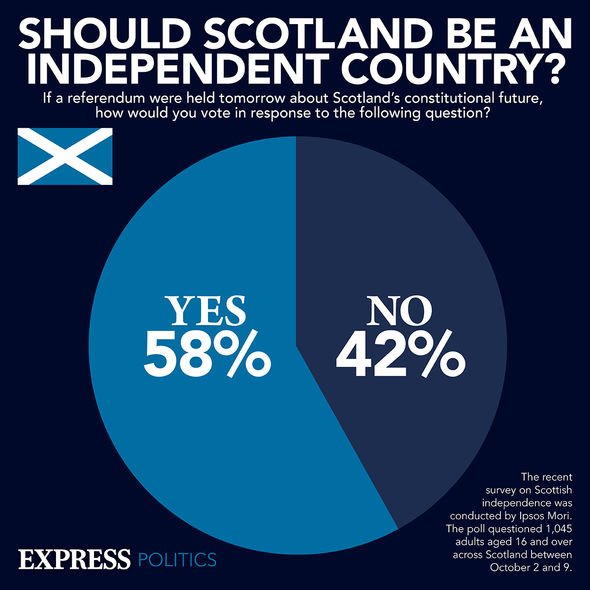
Should Scotland become an independent country? (Image: EXPRESS.CO.UK)
“The reason for that is that if you adopt sterlingisation that is a form of a rigidly fixed exchange rate.
“The UK has a flexible exchange rate. It means that when you get a shock to the economy, you have some means to adjust the economy to that.
“By adopting the currency of another country you really are fixing your currency against that currency. And you have got no means of adjustment.
“That is not tenable for an independent country.
“I have argued separately it could lead to bankruptcy.
“They haven’t thought through the macroeconomic framework.”
Despite the state of the economy, a survey recently conducted by Savanta ComRes showed Ms Sturgeon’s personal ratings are up, with 76 percent of voters believing her to be intelligent – an increase of three points.
Seventy-four percent of respondents said she is a strong leader, also up three points, and 57 percent believe she is genuine, up two points.
More than a third of 2019 Labour voters said the SNP’s response to the pandemic means they are now more likely to vote for the party in the Scottish Parliament election in May, with 13 percent of 2019 Tory voters saying the same thing.
Meanwhile, a majority of Scots continue to support Scottish independence, with the latest survey putting support for ‘Yes’ at 57 percent and ‘No’ at 43 percent.
